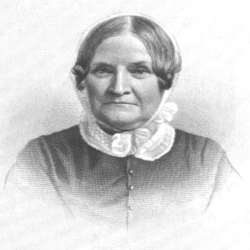
Lydia Maria Child
American Abolitionist
| Date of Birth | : | 11 Feb, 1802 |
| Date of Death | : | 20 Oct, 1880 |
| Place of Birth | : | Medford, Massachusetts, United States |
| Profession | : | Abolitionist |
| Nationality | : | American |
Lydia Maria Child was an American abolitionist, women's rights activist, Native American rights activist, novelist, journalist, and opponent of American expansionism. Her journals, both fiction and domestic manuals, reached wide audiences from the 1820s through the 1850s.
Biography
Born into an abolitionist family, Lydia Maria Francis was primarily influenced in her education by her brother, a Unitarian clergyman and later a professor at the Harvard Divinity School. In the 1820s she taught, wrote historical novels, and founded a periodical for children, Juvenile Miscellany (1826). In 1828 she married David L. Child, an editor. After meeting the abolitionist William Lloyd Garrison in 1831, she devoted her life to abolitionism.
Child’s best-known work, An Appeal in Favor of That Class of Americans Called Africans (1833), related the history of slavery and denounced the inequality of education and employment for Black people in the United States; it was the first such work published in book form. As a result, Child was ostracized socially and her magazine failed in 1834. The book succeeded, however, in inducing many people to join the abolition movement. Child also edited the National Anti-Slavery Standard from 1841 to 1843.
In 1852 the Childs settled permanently on a farm in Wayland, Massachusetts. The couple continued to contribute liberally, from a small income, in support of abolitionist causes. Child worked with Harriet Jacobs to publish, in 1861, Jacobs’s Incidents in the Life of a Slave Girl, which became one of the most important slave narratives. Child also wrote on behalf of the Indigenous peoples of the Americas. Among her many books are three volumes of Flowers for Children (1844–47), Fact and Fiction (1846), The Freedmen’s Book (1865), and An Appeal for the Indians (1868). Child’s other work included popular volumes of advice for women, such as The Frugal Housewife (1829). Her letters were compiled in Lydia Maria Child, Selected Letters, 1817–1880 (1982).
Quotes
Total 0 Quotes
Quotes not found.
